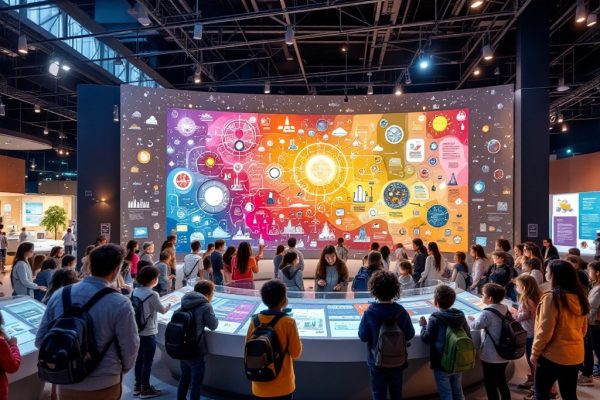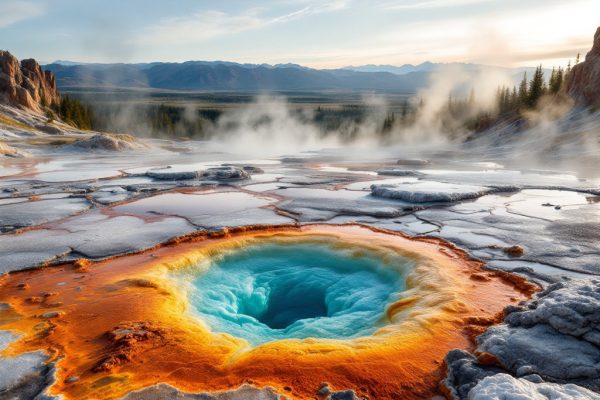How Traveling Influences Science
Ever wondered how exploring new landscapes can boost your brainpower and ignite your creativity? Travel offers profound benefits, from sharpening your cognitive function and fostering mental well-being to building bridges between cultures. Discover how venturing beyond your comfort zone can enhance neuroplasticity, leading to a healthier, more adaptable mind. Explore the transformative power of travel and unlock your potential for personal and intellectual growth. Dive into this article to learn more about the remarkable ways travel can enrich your life.
Important information

- Travel boosts cognitive function: It stimulates the brain, improves memory, enhances creativity, and promotes problem-solving skills.
- Travel improves mental well-being: It reduces stress, combats loneliness, and can alleviate symptoms of depression.
- Travel fosters cultural understanding: Experiencing different cultures promotes empathy, challenges assumptions, and broadens perspectives.
- Travel supports scientific advancement: It exposes researchers to diverse environments, facilitates collaborations, and sparks innovation.
- Travel promotes personal growth: Stepping outside your comfort zone builds resilience, adaptability, and self-awareness.
How Traveling Influences Science: An Overview
Scientific exploration thrives on travel. Exposure to diverse environments and cultures broadens researchers’ perspectives, introducing them to new research practices and sparking innovative questions and methodologies. Travel also facilitates valuable collaborations. By studying phenomena in their natural settings, scientists gather unique data and test hypotheses in real-world contexts. For instance, the Amazon rainforest’s biodiversity offers invaluable insights unattainable in a laboratory setting. International travel further fuels scientific exchange and collaboration, enabling researchers worldwide to share knowledge and accelerate scientific progress, ultimately fostering innovative solutions to global challenges.
The Cognitive Benefits of Travel
Travel offers a multitude of cognitive benefits, sharpening memory and boosting creativity. Exploring new environments stimulates the brain, promoting neuroplasticity and forging new neural connections. This increased flexibility enhances both creative thinking and problem-solving abilities. Moreover, travel fosters mental agility and adaptability, crucial for cognitive growth. Later in life, travel can even protect against cognitive decline, preserving brain health and function by stimulating connections between nerve cells. In essence, travel rewires the brain for enhanced cognitive function.
How Travel Enhances Creativity and Cognitive Flexibility
Travel ignites creativity by exposing you to new cultures and perspectives, boosting your cognitive flexibility. This mental agility enhances problem-solving and inspires innovative thinking. Studies even link international travel to increased creativity: well-traveled fashion designers, for instance, produce more original designs. Experiencing new places stimulates your brain, fostering neuroplasticity and forming new neural connections that promote brain health. Moreover, breaking from your routine through travel can spark fresh insights. It doesn’t require a trip abroad; exploring local destinations can also boost creativity. Even a short excursion can offer a burst of inspiration.
The Role of Neuroplasticity in Travel Experiences
Travel strengthens your brainpower due to neuroplasticity—your brain’s remarkable ability to reorganize itself. New experiences, such as navigating a foreign city or learning a new language, stimulate the brain and promote this reorganization. These activities create new neural pathways, enhancing cognitive flexibility and building resilience. Exploring the world, therefore, leads to a healthier and more adaptable brain.
The Psychological and Mental Health Benefits of Travel
Traveling offers incredible benefits for your mental well-being. It provides a much-needed break from your daily routine, reducing stress and alleviating symptoms of depression. Studies show that vacations can significantly decrease tension and fatigue, while increasing overall life satisfaction. Immersing yourself in new experiences while traveling stimulates brain function and boosts creativity. Even planning a trip can improve your mood; the anticipation itself is often exciting. Furthermore, social interaction inherent in travel combats loneliness. Connecting with locals and fellow travelers creates a sense of belonging and improves overall well-being. Physical activity, like hiking or walking, amplifies these benefits by releasing endorphins and further reducing stress. The pandemic highlighted the psychological value of travel, emphasizing its importance in maintaining mental and emotional health. Travel is more than just sightseeing; it’s a catalyst for forming new neural connections in the brain, which enhances cognitive flexibility and problem-solving skills. Trying new activities, meeting new people, and exploring unfamiliar places maximizes these positive effects.
Travel’s Impact on Brain Health and Function
Exploring new destinations enhances cognitive function. Immersing yourself in different cultures creates neural pathways, boosting memory and sparking creativity. This “neuroplasticity” thrives in stimulating travel environments, strengthening your mind.
Studies indicate travelers are less prone to cognitive decline. Navigating unfamiliar situations challenges the brain, fostering growth and adaptability, ultimately contributing to overall brain health and resilience.
Cultural and Human Connections Through Travel
Travel connects us, building bridges between cultures through shared experiences. It challenges our assumptions, fostering empathy and a deeper appreciation for both our common ground and our unique differences. This journey towards global understanding is fueled by encounters with diverse perspectives, sparking new ideas and enriching our comprehension of the world.Exploration is ingrained in our very being. From our nomadic ancestors onward, the human urge to travel has shaped our social dynamics and resourcefulness. It’s more than just a vacation; it’s a fundamental human drive, fueling our need to discover and adapt.
Travel enhances our social connections, combating loneliness through interactions with fellow travelers and locals. These social exchanges release neurotransmitters that boost our mood and overall mental well-being.
Stepping outside our comfort zones through travel cultivates resilience and adaptability. Opening ourselves to new environments fosters self-awareness, broadens our perspectives, and often sparks personal growth. In essence, travel transforms us.
The Importance of Cultural Exchange and Globalization
Travel is a powerful catalyst for cultural exchange, an essential aspect of globalization. It fosters understanding and tolerance by building bridges between different cultures. Journeys broaden our perspectives and deepen our appreciation for the world’s rich diversity. Immersing ourselves in new cultures challenges preconceived notions and cultivates empathy. This exchange of ideas is fundamental to globalization, sparking innovation and driving international collaboration. Moreover, cultural exchange stimulates economies through tourism and trade partnerships, strengthening global relations and contributing to peace. Ultimately, travel connects us all.
Travel as a Learning Experience
Traveling broadens our understanding of the world by exposing us to new cultures, environments, and perspectives. It encourages exploration and discovery, leading to a deeper appreciation for global diversity. Imagine exploring ancient ruins, participating in local traditions, or navigating a new city. These experiences foster personal growth and a wider worldview. Travel challenges us to adapt, solve problems, and become more self-aware. While travel offers invaluable learning opportunities, it’s essential to travel responsibly, respecting local customs and protecting the environment.
Travel’s Role in Exploration and Discovery
Travel broadens your horizons, igniting curiosity and a thirst for knowledge through firsthand experiences. Connecting with diverse environments and cultures, you gain new perspectives and discover enriching ways of life. Travel also fosters empathy and respect, building bridges between people. Beyond exploring new places, travel offers a journey of self-discovery. Stepping outside your comfort zone cultivates confidence and resilience, ultimately transforming you.













